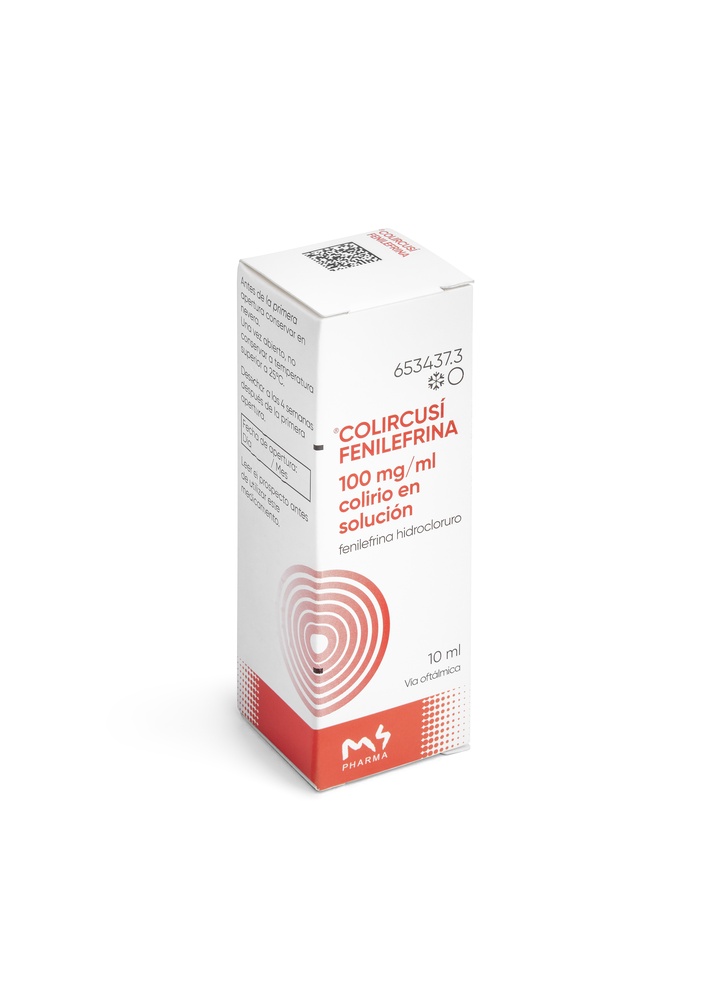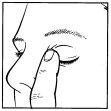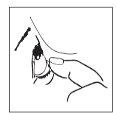

COLIRCUSI FENILEFRINA 100 mg/ml colírio em solução

Pergunte a um médico sobre a prescrição de COLIRCUSI FENILEFRINA 100 mg/ml colírio em solução

Como usar COLIRCUSI FENILEFRINA 100 mg/ml colírio em solução
Introdução
Prospecto: informação para o utilizador
COLIRCUSÍ FENILEFRINA 100 mg/ml colírio em solução
Fenilefrina hidrocloruro
Leia todo o prospecto detenidamente antes de começar a usar este medicamento, porque contém informações importantes para si.
- Conserva este prospecto, porque pode ter que voltar a lê-lo.
- Se tiver alguma dúvida, consulte o seu médico ou farmacêutico.
- Este medicamento foi-lhe prescrito apenas para si, e não deve dá-lo a outras pessoas, mesmo que tenham os mesmos sintomas que si, porque pode prejudicá-las.
- Se experimentar efeitos adversos, consulte o seu médico ou farmacêutico, mesmo que se trate de efeitos adversos que não aparecem neste prospecto. Ver seção 4.
Conteúdo do prospecto
- O que é COLIRCUSÍ FENILEFRINA e para que é utilizado
- O que necessita saber antes de começar a usar COLIRCUSÍ FENILEFRINA
- Como usar COLIRCUSÍ FENILEFRINA
- Possíveis efeitos adversos
- Conservação de COLIRCUSÍ FENILEFRINA
- Conteúdo do envase e informação adicional
1. O que é COLIRCUSÍ FENILEFRINA e para que é utilizado
É um colírio que contém como princípio ativo fenilefrina hidrocloruro, que dilata a pupila.
Colircusí Fenilefrina está indicado para: produzir dilatação da pupila (midriase), para examinar o fundo do olho, facilitar a cirurgia em catarata nuclear (catarata central) e como parte do tratamento de inflamações da camada intermédia do olho (uveíte), em particular, a parte colorida do olho (irite) e inflamação desta e do corpo ciliar (iridociclite).
2. O que necessita saber antes de começar a usar COLIRCUSÍ FENILEFRINA
Não use Colircusí Fenilefrina:
- Se for alérgico a fenilefrina ou a algum dos outros componentes deste medicamento (incluídos na seção 6).
- Em crianças menores de 12 anos e pacientes de idade avançada.
- Se tiver glaucoma de ângulo estreito (pressão aumentada nos olhos) ou ângulo estreito nos olhos por anatomia (com bloqueio dos canais de drenagem).
- Se tiver a pressão sanguínea alta (hipertensão grave).
- Se tiver antecedentes de doença arterioesclerótica grave, cardiovascular ou cerebrovascular, latidos do coração rápidos (taquicardia ventricular) ou doença do coração. Se tiver algum aneurisma (alargamento em um vaso sanguíneo que poderia aparecer como bolha).
- Se foi operado dos olhos.
Advertências e precauções
Consulte o seu médico ou farmacêutico antes de começar a usar Colircusí Fenilefrina.
- Apenas utilize este medicamento no(s) seu(s) olho(s).
- Não o utilize após uma operação no olho(s), nem em olhos doentes, danificados, sem lágrimas, ou durante anestesia, porque o medicamento pode ser absorvido em quantidade suficiente para produzir efeitos adversos como aumento da pressão da sangue.
- Depois da aplicação, mantenha os olhos fechados enquanto pressiona suavemente com um dedo o canal lacrimal durante 2 minutos. Ver seção 3. “Como usar COLIRCUSÍ FENILEFRINA”.
- Deve controlar a pressão arterial após a aplicação deste medicamento em pacientes suscetíveis e, em particular, em pacientes com alguma doença do sistema nervoso autónomo (que controla as ações involuntárias, como os latidos do coração, vasos sanguíneos, entre outras).
- Deve ter precaução ou evitar o tratamento ao mesmo tempo que use este medicamento com medicamentos como inibidores da monoamino oxidase (IMAOs), antidepressivos tricíclicos, fármacos anti-hipertensivos (para baixar a pressão sanguínea), atropina ou anestésicos que sensibilizam o coração aos simpaticomiméticos (ver apartado "Outros medicamentos e Colircusí Fenilefrina").
- Lave as mãos imediatamente após manipular o frasco ou após aplicar este medicamento.
- Este medicamento deve ser usado com muita precaução:
- se padece bloqueio cardíaco parcial (defeito na condução do coração),
- latidos do coração mais lentos do que o normal (bradicardia),
- se padece atividade excessiva da glândula tireoide (hipertireoidismo),
- se é diabético dependente de insulina,
- se tem baixadas de pressão (desmaios, tonturas) relacionadas com os cambios de posição (ao levantar-se após ter estado sentado durante muito tempo) (hipotensão ortostática).
- Colircusí Fenilefrina não deve ser utilizado em crianças menores de 12 anos, porque as crianças parecem ser mais sensíveis ao risco de efeitos adversos graves.
- Colircusí Fenilefrina não é recomendado em crianças entre 12 e 18 anos, porque falta experiência clínica adequada.
Crianças
- Este medicamento não deve ser usado em crianças menores de 12 anos devido ao risco aumentado de toxicidade sistémica. As crianças podem ser especialmente sensíveis aos efeitos da fenilefrina, com possíveis efeitos adversos importantes no coração e na circulação.
Pacientes de idade avançada
- Este medicamento não deve ser usado em pacientes de idade avançada. Neles, o medicamento tem efeitos estimulantes do sistema nervoso central. Além disso, estes pacientes sofrem uma maior subida da tensão da sangue do que os jovens.
- Este medicamento poderia produzir ao dia seguinte o efeito contrário à dilatação, ou seja, miosis (contracção da pupila) de rebote. O médico deve controlar este efeito.
- Nos pacientes mais velhos, é mais frequente que se produzam grânulos flutuantes de pigmento nos olhos.
Outros medicamentos e Colircusí Fenilefrina
Informa ao seu médico ou farmacêutico se está utilizando, utilizou recentemente ou poderia ter que utilizar qualquer outro medicamento.
Em particular, informa ao seu médico se está utilizando ou poderia estar exposto a:
- Inibidores da monoamino oxidase (IMAOs). Mesmo que os tenha tomado durante as últimas 3 semanas (são medicamentos para tratar a depressão ou a doença de Parkinson).
- Antidepressivos tricíclicos.
- Medicamentos que reduzem a pressão sanguínea, chamados anti-hipertensivos (guanetidina, reserpina, e betabloqueantes não seletivos, tais como o propranolol).
- Medicamentos cicloplégicos (dilatadores da pupila) do tipo da atropina.
- Fármacos anestésicos que se inhalam.
- Azul de metileno (utilizado em cirurgia, entre outros usos).
Informa ao seu médico se vai ser submetido a uma operação com anestesia.
Uso de Colircusí Fenilefrina com alimentos e bebidas
- Bebidas à base de laranja amarga: se contêm como aditivo algum estimulante semelhante ao princípio ativo deste medicamento, poderia produzir-se aumento de efeitos estimulantes.
Gravidez, lactação e fertilidade
Se está grávida ou em período de lactação, acredita que poderia estar grávida ou tem intenção de ficar grávida, consulte o seu médico ou farmacêutico antes de utilizar este medicamento.
Como medida de precaução, é preferível evitar o uso de Colircusí Fenilefrina durante a gravidez.
Se está em período de lactação, o seu médico deve decidir se é necessário interromper a lactação ou interromper o tratamento com este medicamento, tendo em conta o benefício da lactação para o bebê e o benefício do tratamento para a mãe.
Condução e uso de máquinas
Poderá notar visão borrosa e outras alterações visuais durante um tempo prolongado. Não conduza nem utilize máquinas até que tenha desaparecido este efeito.
Colircusí Fenilefrina contém tiomersal e fosfatos
Este medicamento pode produzir reações alérgicas porque contém tiomersal.
Este medicamento contém 1,1 mg de fosfatos em cada ml.
Se sofre de dano grave na córnea (a camada transparente da parte frontal do olho), o tratamento com fosfatos, em casos muito raros, pode provocar visão borrosa por acumulação de cálcio.
3. Como usar COLIRCUSÍ FENILEFRINA
Siga exatamente as instruções de administração deste medicamento indicadas pelo seu médico. Em caso de dúvida, consulte novamente o seu médico ou farmacêutico.
- Para limitar a quantidade de medicamento que passa para a sangue após a aplicação do colírio
mantenha os olhos fechados enquanto pressiona suavemente com um dedo o canal lacrimal durante, pelo menos, 2 minutos.
A dose recomendada é:
Uso em adultos
Para o exame do fundo do olho, recomenda-se aplicar uma gota em cada olho. Se for necessário, pode-se repetir a aplicação em 1 hora.
Quando se busca um efeito sustentado, recomenda-se aplicar uma gota 2 ou 3 vezes ao dia.
Antes de uma intervenção de catarata, a dose normal é de uma gota na conjuntiva entre 30 e 60 minutos antes da cirurgia.
No tratamento de irite e iridociclite, aplique uma gota. Se for necessário, pode-se repetir no dia seguinte. O tratamento não pode exceder 3-5 dias seguidos; se não melhorar, consulte com o médico.
Uso em crianças
Este medicamento está contraindicado em crianças menores de 12 anos devido ao risco aumentado de toxicidade sistémica.
Recomendações de uso:


12
- Lave as mãos.
- Pegue o frasco.
- Desprenda o frasco puxando a pestaña para fora e retire o capuchão.
- Segure o frasco boca abaixo, entre os dedos.
- Incline a cabeça para trás. Separe suavemente a pálpebra do olho com um dedo até que se forme uma bolsa entre a pálpebra inferior e o seu olho, na qual deverá cair a gota (figura 1).
- Coloque a ponta do conta-gotas perto do olho. Pode ser-lhe útil um espelho.
- Não toque no olho, na pálpebra, zonas próximas nem outras superfícies com o conta-gotas. O colírio poderia contaminar-se.
- Aperte suavemente o conta-gotas de borracha situado na parte superior do frasco, enquanto dirige o olhar para cima.
- Depois de utilizar este colírio, pressione com o dedo o bordo do olho junto à nariz durante, pelo menos, 2 minutos (figura 2). Isso ajuda a evitar que o medicamento passe para o resto do corpo.
- Se aplicar gotas em ambos os olhos, repita todos os passos anteriores com o outro olho.
- Feche bem o frasco imediatamente após utilizar o produto.
- Recomenda-se lavar as mãos após ter manipulado o frasco ou após ter-se aplicado o colírio.
Se uma gota cair fora do olho, tente novamente.
Se está utilizando outros medicamentos oftálmicos, espere pelo menos 5 minutos entre a administração deste medicamento e os outros medicamentos oftálmicos. As pomadas oftálmicas devem ser administradas por último.
Se usar mais Colircusí Fenilefrina do que deve
Pode eliminá-lo lavando os olhos com água morna. Não se aplique mais gotas até que volte a tocar-lhe.
Em caso de sobredose ou ingestão acidental, acuda a um centro médico ou consulte imediatamente o seu médico ou farmacêutico, ou ligue para o Serviço de Informação Toxicológica, telefone: 91 562 04 20, indicando o medicamento e a quantidade utilizada.
Os sintomas de toxicidade que podem aparecer são de estimulação simpática. Em caso de ingestão acidental, este medicamento pode causar pressão sanguínea alta, dor de cabeça, convulsões, hemorragia cerebral, aumento anormal das palpitações do coração, sensações de formigamento, calor ou frio na pele (parestesia) ou vómitos. Líquido nos pulmões (edema pulmonar) e paro cardíaco.
Em caso de sobredose e devido a que qualquer reação grave devida à fenilefrina aparece rapidamente, recomenda-se acudir a um centro médico para receber tratamento de manutenção.
Para o tratamento da hipertensão como consequência do estreitamento dos vasos (vasoconstricção), deve evitar-se o uso de betabloqueantes e de bloqueadores dos canais do cálcio.
Se esquecer de usar Colircusí Fenilefrina
Não se aplique uma dose dupla para compensar as doses esquecidas.
Se tiver alguma outra dúvida sobre o uso deste medicamento, pergunte ao seu médico ou farmacêutico.
4. Possíveis efeitos adversos
Como todos os medicamentos, este medicamento pode produzir efeitos adversos, embora nem todas as pessoas os sofram.
Foram notificados os seguintes efeitos adversos com este medicamento:
Efeitos adversos de frequência não conhecida (não pode ser estimada a partir dos dados disponíveis).
- Efeitos no olho: dor no olho, irritação no olho, vermelhidão do olho, inflamação da conjuntiva e/ou eczema na pálpebra.
- Efeitos gerais: alergia, tontura, aumento da pressão sanguínea, aumento da frequência cardíaca (latidos do coração), líquido nos pulmões, inflamação da pele.
Outros efeitos adversos em crianças
Líquido ou inchaço nos pulmões: frequência não conhecida (não pode ser estimada a partir dos dados disponíveis.
Outros efeitos adversos que podem produzir este tipo de fármacos
Em casos muito raros, alguns pacientes com a camada transparente da parte frontal do olho (a córnea) gravemente danificada, experimentaram zonas nubladas na córnea devido à acumulação de cálcio durante o tratamento.
Foram notificados: dor de cabeça, distúrbios do ritmo cardíaco (extrasístoles), desmaios. A incidência de acontecimentos adversos com fenilefrina 100 mg/ml é maior do que com concentrações mais baixas.
Este colírio causou algumas vezes complicações cardiovasculares graves, incluindo infarto de miocárdio.
Comunicação de efeitos adversos
Se experimentar qualquer tipo de efeito adverso, consulte o seu médico ou farmacêutico, mesmo que se trate de possíveis efeitos adversos que não aparecem neste prospecto. Também pode comunicá-los diretamente através do Sistema Espanhol de Farmacovigilância de medicamentos de Uso Humano: https://www.notificaRAM.es.Mediante a comunicação de efeitos adversos, você pode contribuir para fornecer mais informações sobre a segurança deste medicamento.
5. Conservação de COLIRCUSÍ FENILEFRINA
Mantenha este medicamento fora da vista e do alcance das crianças.
Antes da primeira abertura, conserve em frigorífico (entre 2°C e 8°C).
Uma vez aberto, não conserve a temperatura superior a 25°C.
Para evitar infecções, deve descartar o frasco 4 semanas após tê-lo aberto pela primeira vez.
Anote a data de abertura do frasco no recuadro reservado para esta finalidade na caixa.
Não utilize este medicamento após a data de caducidade que aparece no frasco e na caixa após CAD. A data de caducidade é o último dia do mês que se indica.
Os medicamentos não devem ser jogados nos deságues nem na lixeira. Deposite os envases e os medicamentos que não precisa no Ponto SIGRE da farmácia. Em caso de dúvida, pergunte ao seu farmacêutico como se livrar dos envases e dos medicamentos que não precisa. Dessa forma, ajudará a proteger o meio ambiente.
6. Conteúdo do envase e informação adicional
Composição de COLIRCUSÍ FENILEFRINA
- O princípio ativo é fenilefrina hidrocloruro. Um ml de solução contém 100 mg de fenilefrina hidrocloruro (10%).
- Os demais componentes são: tiomersal, hidrogenofosfato de disódio dodeca-hidratado, sulfito de sódio anidro e água purificada.
Aspecto do produto e conteúdo do envase
Colircusí Fenilefrina é um colírio em solução; é um líquido transparente e incolor ou ligeiramente amarelado.
Apresenta-se em envase conta-gotas (frasco de vidro opaco com dispensador de borracha), com 10 ml de colírio em solução.
Titular da autorização de comercialização
M4 PHARMA, S.L.
Tânger, 86
08018 Barcelona – Espanha
Responsável pela fabricação
TUBILUX PHARMA, S.P.A.
Via Costa Rica 20/22
Pomezia, Roma - I-00071
Itália
Data da última revisão deste prospecto:Janeiro 2021
A informação detalhada deste medicamento está disponível na página Web da Agência Espanhola de Medicamentos e Produtos Sanitários (AEMPS) http://www.aemps.gob.es

Quanto custa o COLIRCUSI FENILEFRINA 100 mg/ml colírio em solução em Espanha em 2025?
O preço médio do COLIRCUSI FENILEFRINA 100 mg/ml colírio em solução em dezembro de 2025 é de cerca de 5.34 EUR. Os valores podem variar consoante a região, a farmácia e a necessidade de receita. Confirme sempre com uma farmácia local ou fonte online para obter informações atualizadas.
- País de registo
- Preço médio em farmácia5.34 EUR
- Disponibilidade em farmáciasProblema de disponibilidade reportado
- Substância ativa
- Requer receita médicaSim
- Fabricante
- Esta informação é apenas para referência e não constitui aconselhamento médico. Consulte sempre um médico antes de tomar qualquer medicamento. A Oladoctor não se responsabiliza por decisões médicas baseadas neste conteúdo.
- Alternativas a COLIRCUSI FENILEFRINA 100 mg/ml colírio em soluçãoForma farmacêutica: COLÍRIO, 100 mg/mlSubstância ativa: phenylephrineFabricante: Bausch + Lomb Ireland LimitedRequer receita médicaForma farmacêutica: COLÍRIO, -Substância ativa: atropineFabricante: Alcon Healthcare S.A.Requer receita médicaForma farmacêutica: COLÍRIO, 5 mgSubstância ativa: atropineFabricante: Alcon Healthcare S.A.Requer receita médica
Alternativas a COLIRCUSI FENILEFRINA 100 mg/ml colírio em solução noutros países
As melhores alternativas com o mesmo princípio ativo e efeito terapêutico.
Alternativa a COLIRCUSI FENILEFRINA 100 mg/ml colírio em solução em Polónia
Alternativa a COLIRCUSI FENILEFRINA 100 mg/ml colírio em solução em Ukraine
Médicos online para COLIRCUSI FENILEFRINA 100 mg/ml colírio em solução
Avaliação de posologia, efeitos secundários, interações, contraindicações e renovação da receita de COLIRCUSI FENILEFRINA 100 mg/ml colírio em solução – sujeita a avaliação médica e regras locais.














